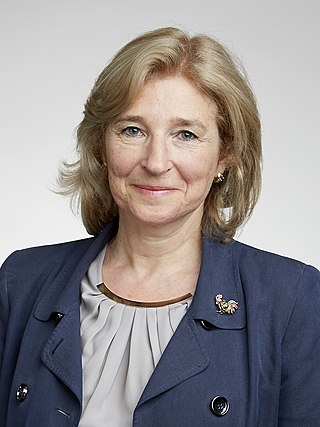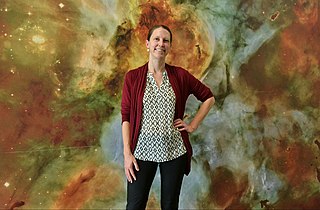Related Research Articles

Dame Susan Jocelyn Bell Burnell is an astrophysicist from Northern Ireland who, as a postgraduate student, discovered the first radio pulsars in 1967. The discovery eventually earned the Nobel Prize in Physics in 1974; however, she was not one of the prize's recipients.
John Herbert Chapman was a Canadian space researcher. He started his career with his work on radio propagation and the ionosphere.
The Engineering and Physical Sciences Research Council (EPSRC) is a British Research Council that provides government funding for grants to undertake research and postgraduate degrees in engineering and the physical sciences, mainly to universities in the United Kingdom. EPSRC research areas include mathematics, physics, chemistry, artificial intelligence and computer science, but exclude particle physics, nuclear physics, space science and astronomy. Since 2018 it has been part of UK Research and Innovation, which is funded through the Department for Business, Energy and Industrial Strategy.
Michael John Seaton was an influential British mathematician, atomic physicist, and astronomer.
Dame Carole Jordan,, is a British physicist, astrophysicist, astronomer and academic. Currently, she is Professor Emeritus of Astrophysics at the University of Oxford and Emeritus Fellow at Somerville College, Oxford. From 1994 to 1996, she was President of the Royal Astronomical Society; she was the first woman to hold this appointment. She won the Gold Medal of the Royal Astronomical Society in 2005; she was only the third female recipient following Caroline Herschel in 1828 and Vera Rubin in 1996. She was head of the Rudolf Peierls Centre for Theoretical Physics at the University of Oxford from 2003 to 2004 and 2005 to 2008, and was one of the first female professors in Astronomy in Britain. She was made a Dame Commander of the Order of the British Empire in 2006 for services to physics and astronomy.

Jameel Sadik "Jim" Al-Khalili is an Iraqi-British theoretical physicist, author and broadcaster. He is professor of theoretical physics and chair in the public engagement in science at the University of Surrey. He is a regular broadcaster and presenter of science programmes on BBC radio and television, and a frequent commentator about science in other British media.
Dame Lynn Faith Gladden is the Shell Professor of Chemical Engineering at the University of Cambridge. She served as Pro-vice-chancellor for research from 2010 to 2016.

Victoria Michelle Kaspi is a Canadian astrophysicist and a professor at McGill University. Her research primarily concerns neutron stars and pulsars.

The Edward Appleton Medal and Prize is awarded by the Institute of Physics for distinguished research in environmental, earth or atmospheric physics. Originally named after Charles Chree, the British physicist and former President of the Physical Society of London, it was renamed in 2008 to commemorate Edward Victor Appleton, winner of the Nobel prize for proving the existence of the ionosphere.

Margaret Galland Kivelson is an American space physicist, planetary scientist, and distinguished professor emerita of space physics at the University of California, Los Angeles. From 2010 to the present, concurrent with her appointment at UCLA, Kivelson has been a research scientist and scholar at the University of Michigan. Her primary research interests include the magnetospheres of Earth, Jupiter, and Saturn.

Molly Morag Stevens is Professor of Biomedical Materials and regenerative medicine and Research Director for Biomedical Materials Sciences in the Institute of Biomedical Engineering at Imperial College London.

Michael Lockwood FRS is a Professor of Space Environment Physics at the University of Reading.

Polina Leopoldovna Bayvel is a British engineer and academic. She is currently Professor of Optical Communications & Networks in the Department of Electronic and Electrical Engineering at University College London. She has made major contributions to the investigation and design of high-bandwidth multiwavelength optical networking.

Heather A. Knutson is an astrophysicist and professor at California Institute of Technology in the Division of Geological and Planetary Sciences. Her research is focused on the study of exoplanets, their composition and formation. She won the American Astronomical Society's Newton Lacy Pierce Prize in Astronomy for her work in exoplanetary atmospheres.
Barry Ramachandra Rao was an Indian space physicist and the vice chairman of the University Grants Commission of India. Known for his pioneering research in radio physics, Rao was a Member of Parliament of the Rajya Sabha and an elected fellow of all the three major Indian science academies viz. Indian Academy of Sciences, Indian National Science Academy and National Academy of Sciences, India. The Council of Scientific and Industrial Research, the apex agency of the Government of India for scientific research, awarded him the Shanti Swarup Bhatnagar Prize for Science and Technology, one of the highest Indian science awards for his contributions to Physical Sciences in 1965.
Anne Neville was the Royal Academy of Engineering Chair in emerging technologies and Professor of Tribology and Surface Engineering at the University of Leeds.
Washington Yotto Ochieng is a Kenyan academic who is Head of the Department of Civil and Environmental Engineering at Imperial College London. Previously, he was Head of the Centre for Transport Studies and Co-Director of the Institute for Security Science and Technology(ISST) together with Deeph Chana. Ochieng is a Senior Security Science Fellow in ISST. He also serves as Director of the Engineering Geomatics Group and Chair of Positioning and Navigation Systems.
Karen Aplin is a British atmospheric and space physicist. She is currently a professor at the University of Bristol. Aplin has made significant contributions to interdisciplinary aspects of space and terrestrial science, in particular the importance of electrical effects on planetary atmospheres. She was awarded the 2021 James Dungey Lectureship of the Royal Astronomical Society.

Rebecca Smethurst, also known as Dr. Becky, is a British astrophysicist, author, and YouTuber who is a junior research fellow at the University of Oxford. She was the recipient of the 2020 Caroline Herschel Prize Lectureship, awarded by the Royal Astronomical Society, as well as the 2020 Mary Somerville Medal and Prize, awarded by the Institute of Physics. In 2022, she won the Royal Astronomical Society's Winton Award "for research by a post-doctoral fellow in Astronomy whose career has shown the most promising development". As a researcher, Smethurst studies the role that supermassive black holes play in inhibiting different types of galaxies from forming stars. She is a member of the Galaxy Zoo collaboration, run by her doctoral advisor, Chris Lintott. Smethurst hosts her own YouTube channel, called Dr. Becky, where she posts science communication videos related to astronomy research and amateur astronomy. She has also written two popular science books, titled Space: 10 Things You Should Know and A Brief History of Black Holes.
Sandra C. Chapman CPhysis FInstP FRAS a British astrophysicist who is Professor of Astrophysics and Director of the Centre for Fusion, Space and Astrophysics at the University of Warwick. Her research considers nonlinear physics and planetary magnetospheres. She was awarded the 2022 Royal Astronomical Society Chapman Medal.
References
- ↑ "Cathryn Mitchell". the University of Bath's research portal. Retrieved 2019-07-24.
- ↑ "Award for Professor Cathryn Mitchell, M0IBG - Radio Society of Great Britain - Main Site : Radio Society of Great Britain – Main Site". rsgb.org. Retrieved 2019-07-24.
- 1 2 Thompson, J. M. T. (2007). Advances in Earth Science: From Earthquakes to Global Warming. Imperial College Press. ISBN 9781860948718.
- 1 2 "Professor Cathryn Mitchell, University of Bath - EPSRC website". epsrc.ukri.org. Retrieved 2019-07-07.
- ↑ "Cathryn Mitchell". Radio Communications Foundation. Retrieved 2019-07-07.
- 1 2 "2019 Edward Appleton Medal and Prize". www.iop.org. Archived from the original on 2019-07-07. Retrieved 2019-07-07.
- ↑ "New Doctoral College appoints Academic Director". www.bath.ac.uk. Retrieved 2019-07-07.
- ↑ "Science Explained: How does sat-nav work?". BBC News. Retrieved 2019-07-07.
- ↑ Thompson, J. M. T. (2007). Advances in Earth Science: From Earthquakes to Global Warming. Imperial College Press. ISBN 9781860948718.
- ↑ The Royal Society (2016-04-14), Who will save us from space storms? , retrieved 2019-07-07
- 1 2 "Professor Cathryn Mitchell | Royal Society". royalsociety.org. Retrieved 2019-07-07.
- ↑ "Cathryn Mitchell — the University of Bath's research portal". researchportal.bath.ac.uk. Retrieved 2019-07-07.
- ↑ "Scientist Cathryn Mitchell, M0IBG, Honored for Ionospheric Imaging Research". www.arrl.org. Retrieved 2019-07-07.
- ↑ "Cathryn Mitchell". The Conversation. 7 October 2014. Retrieved 2019-07-07.
- ↑ "Chapman Medal Winners" (PDF). Royal Astronomical Society. Retrieved 29 August 2020.
- ↑ "Professor Cathryn Mitchell awarded Institute of Physics prize". www.bath.ac.uk. Retrieved 2019-07-07.